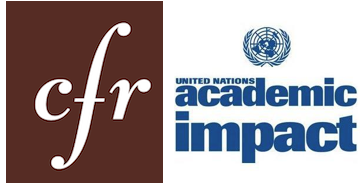A discussion on the risks and benefits of hydraulic fracturing was hosted by the UN Academic Impact (UNAI) and the US Council on Foreign Relations (CFR).
The event examined the potential extent and consequences of the US hydraulic fracturing boom for international security, economics and security, and discussed a potential role for the UN in supporting countries in making related decisions.
 16 July 2014: A discussion on the risks and benefits of hydraulic fracturing was hosted by the UN Academic Impact (UNAI) and the US Council on Foreign Relations (CFR). The event examined the potential extent and consequences of the US hydraulic fracturing boom for international security, economics and security, and discussed a potential role for the UN in supporting countries in making related decisions.
16 July 2014: A discussion on the risks and benefits of hydraulic fracturing was hosted by the UN Academic Impact (UNAI) and the US Council on Foreign Relations (CFR). The event examined the potential extent and consequences of the US hydraulic fracturing boom for international security, economics and security, and discussed a potential role for the UN in supporting countries in making related decisions.
The conversation, held at UN Headquarters, in New York, US, on 16 July 2014, and titled ‘What Fracking Means for the World,’ was led by Michael A. Levi, David M. Rubenstein Senior Fellow for Energy and the Environment and Director at the CFR, who was joined by Elizabeth Thompson, Senior Adviser of the UN Secretary-General’s Sustainable Energy for All (SE4ALL) Initiative and former Minister for Energy and Environment of Barbados.
Issues debated included whether natural gas produced by hydraulic fracturing is a cleaner energy source, and if natural gas and hydraulic fracturing could help solve the problems of energy security and climate change. Levi suggested that the UN could help countries “set a direction” for taking advantage of a variety of low-carbon energy sources, including natural gas, and in facilitating interactions between regulators and planners.
The UN notes that almost half of the world’s population lacks reliable access to modern energy services, and that natural gas is increasingly considered a “bridge fuel” to a zero-carbon economy. Hydraulic fracturing allows tapping into large unconventional reserves of natural gas, in particular in the US where the technology was developed. Environmental and health concerns relating to the technology include: seepage of dangerous chemicals into water supplies; deterioration of air quality; earthquakes; and negative impacts on communities. The UN observes that opposition to the use of the technology has been “loud but hardly unanimous” among countries.
For this reason, Thompson explained that the UN does not intervene in countries’ decisions but will support countries “in making the correct policy decisions,” and is proposing to develop expertise and literature to educate decision makers to this end. She expressed concern over: a spread of hydraulic fracturing in Africa or small island developing States (SIDS), noting a current lack of capacity to oversee, regulate and manage the technologies; and using hydraulic fracturing and natural gas “as an end in themselves” instead of in the context of transitioning to greener fuels.
The discussion was held as part of an UNAI series titled ‘CFR@UNAI’ that brings experts from the CFR to UN Headquarters to address visiting students, teachers and other guests on issues of current interest. [UN Feature Story] [UN Press Release] [UNAI Website]